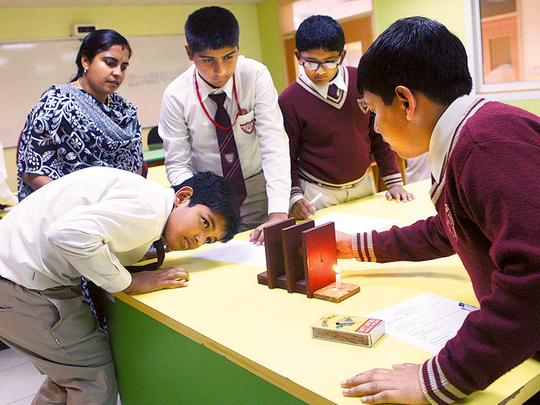
Dubai: Universities and schools in the region are stifling children’s creativity, a new study commissioned by Dubai Knowledge Village has found.
A whooping 73 per cent of the 5,891 respondents, who were surveyed in a poll, agreed that creativity is currently being restricted by the education system in the Middle East and North Africa (Mena) region.
This is problematic as 89 per cent of respondents — who came from 11 different Mena countries — believe that creative thinking is key to driving social and economic growth in their country.
It is also an issue because the UAE aims to focus on boosting innovation in universities and schools to meet the country’s ‘National Innovation’ strategy.
The study, which is titled ‘Education and innovation in the Mena’ and conducted by Bayt.com also revealed that 75 per cent think that standardised education testing systems reduce creative thinking.
Dr Ayoub Kazim, managing director of Dubai Knowledge Village, agreed with the statistic, saying that the education system in the UAE is rigid and not flexible to changes the country is undergoing as well as technological developments.
He also stressed that there is a lack of investment and funding in the country that restricts innovation.
“We should focus on allocating more resources to fund research. In the UAE, the spending is less than 1 per cent, while it has to be between 2-5 per cent of the GDP. The government is taking a step and is going to allocate Dh14 billion on scientific research, but it is not enough as the private sector should also step up and do its share.”
Dr Kazim said Tecom Investments will also contribute to this by launching a Dh4.6 billion innovation hub in 2017, which will focus on funding small businesses and mentoring and guiding future inventors.
While Dr Kazim believes that focusing on innovation is critical, Dr Yousuf Al Assaf, President, Rochester Institute in Dubai, said although it is critical, it should not be rushed.
“I think the problem here is that innovation is not an embedded value in universities and the society as a whole. If it were, things would be different. Mindsets should be changed but if it needs 10 years, let it take 10 years and be done properly instead of rushing it.”
Palestinian university student Saif Faisal, who goes to Wollongong University, agreed that the education system needs to change fast.
“I never had a public speech class in school and then suddenly as a freshman in university, I was asked by almost all my professors to present a paper. I think it is great that the government wants to focus on innovation and on the more practical approaches to education. I think change should be implemented quickly because I for one suffered in university and I don’t want others to face the same problem.”
Jordanian parent Manal Waleed, on the other hand, thinks that schools are more aware about the importance of nurturing creativity and innovation.
“My son takes part in school debates. He is also involved in experiments in his science class. I think my son’s school is doing a good job in nurturing creativity and I think all schools should do the same.”
Creativity needed in workplace
The survey also stressed the need of creativity in the work force, with 89 per cent saying that creative thinking and related skill sets are very important for getting a job in today’s market.
Tareq Al Sakka, CEO of Dubai Refreshments Co, stressed that creativity and soft skills are needed in the business sector, adding that schools do not equip children with the skills needed in the workforce.
“The current education system prepares children who can pass tests. But, in reality, different types of skills are needed in the industry. You need interpersonal skills, the ability to adapt and agility.”
When it comes to creativity in the work place, 42 per cent of the Mena professional respondents cited lack of money as a key challenge in prioritising creativity.
It was followed by 16 per cent who identified a lack of knowledge as a reason and 10 per cent who said age was the biggest barrier to creativity.












